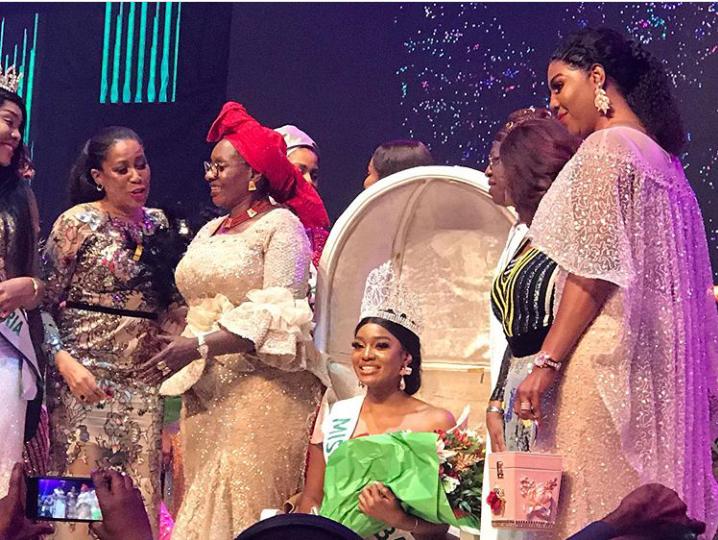Violence against women and girls: Can Nigeria ever tame this monster?

In Nigeria, a common counsel to girls about to marry is the need to keep her family’s secrets secret. She is told to avoid bringing in a third party into her marital quarrels so that her home’s dirty linens would not be exposed to the outside world.

Stripped of all diplomatic niceties, it simply means that the young girl is now alone and on her own. It means she should silently accept and tolerate whatever comes her way, including abuse and violence, as just part of what she must live with as a married woman.
Miss Nigeria 2019: Queen Beauty Tukura emerges winner from Taraba
To affirm that stance, parents, in most cases, chase away daughters fleeing from abusive homes. The poor woman is dragged back to the husband’s home and forced to live with whatever is thrown at her.
Condemned into this sordid arrangement by an unfeeling society, most a hapless and helpless woman surrenders to fate, certain of nothing except misery and a bleak, blank and black future.
Dr Danladi Bako, former NTA Director and information commissioner in Sokoto State, who spoke recently on this age-old counsel and the culture of forcing women to stoically endure violence and abuses just to remain in a husband’s house, said that it was at the root of the worsening violence against women and girls.
“That crude culture is a major impediment to tackling gender-based violence in the country,” Bako said at a media dialogue organised by Spotlight Initiative, a global partnership between European Union and UN focused on ending the violence.
Bako’s views were captured in a paper titled: “Changing the Narrative of the Rights of Women and Girls – Creating a New Social Order in Nigeria”.
“Women go through a rough time in their homes, but cultural, religious and traditional factors have made it difficult for her to rise and shout.
“From day one, the woman is told to accept her fate and learn to tolerate and live with it because she is not the only one in that shoe.
“She is told by even her mother that what she may find in her marital home is the fate of every woman,’’ Bako, a development communication specialist, said.
He regretted that even educated women were not voicing out their plight, saying that such silence was worsening the situation and frustrating the search for solutions.
Bako particularly condemned cultures that exploit and demean women, especially the girl-child, who is always denied education, thrown into early marriage and forced into the streets to hawk.
“From my findings, half of the girls that hawk are victims of rape. Girls that hawk groundnuts make an average gain of N200 daily, but they could get N5,000 just by `entering’ the room of a `customer’. This is where the real trouble starts because N5,000 is too tempting for a girl from a poverty-stricken family,’’ he said.
He called for the right political will to tame the menace, and lamented that groups and individuals trying to enlighten women to stand up for their rights in his native Sokoto are often accused of mobilising women to revolt against cultural norms.
Bako called for total commitment to the goal of ending the injustices against women, and regretted that not much had changed in spite of the creation of women affairs ministries and women development commissions
at the federal and state levels.
In her contribution, Hajia Hadiza Aminu, Coordinator, EU/UN Spotlight Initiative, blamed the rising violence against women and girls on the lack of education, and called for more educational opportunities to
make women self-reliant.
“Most women remain in abusive homes because they are afraid of the economic consequences of being thrown out. Once they are educated and engaged in activities that will fetch them their daily bread, they will be economically independent and will not be afraid to walk away.
“Once a woman is sure of where her next meal could come from, outside her marital home, no one can force her to remain where she is not comfortable, appreciated or loved,’’ she said.
She condemned the discrimination meted out to the girl-child by a society that values male children more, and challenged the media to fight against that injustice.
“There are many media houses in Nigeria. There are television and radio stations, newspapers, magazines and online publications. These media houses must give more air time and pages to gender violence issues. Currently, all the attention is on politics !
“We must build a society that sees and treats everyone as equal. We must all support every child, male or female, to attain his or her dreams so that we can have a society with opportunities and hope for everyone.’’
Aminu decried the harassment and torture girls go through to secure admission, attend schools, get jobs and even grow in their careers, alleging that men are always asking girls for sexual gratification in exchange for grades, jobs, promotions and basic rights routinely enjoyed by the boys.
Dr Ibe Ifeakandu, Head of Department, Public Law, Nigeria Institute of Advanced Legal Studies, who spoke on `safeguarding the dignity of women and girls’, was particularly concerned about early marriage.
“Marriage is a contract for consenting adults. A child that is 10 years old cannot enter into a contract because the law does not allow her to do so. Such a child is too young to understand and appreciate the consequences of doing so.
“What it simply means is that it is against the Nigerian constitution to force such a child into a union that she does not understand because the girl is not developed enough to understand the psychological and physiological implications of being a married woman.
“There is even some double standard here. Men force their 10-year-old girls to marry, but will not allow their 10-year-old boys to marry. The girl is given out, but the son is protected. In most cases, a man gets mad if he suspects that an elderly woman is enticing his young son, but he encourages old men to entice his little daughter.
“They will tell you that a girl should get married immediately she reaches puberty, but will not accept that their little boys should do same on attaining that stage. This is unacceptable and we cannot continue this way,’’ Ifeakandu said.
Ifeakandu also spoke on Female Genital Mutilation (FGM), a very harmful practice that involves the removal of the clitoris in the vagina of young girls.
“FGM is a very humiliating practice. Its aim is to reduce the enjoyment of sex. That, certainly, is not fair to the woman because it violates her natural right to enjoy sex.
By Ephraims Sheyin, News Agency of Nigeria (NAN)










